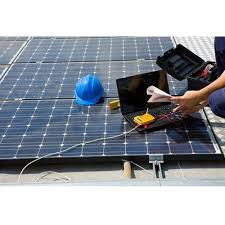What's not to love about solar power? The sun is what allows life to exist on this planet. Since man invented the light-bulb, we've been trying to harness and illuminate the inside of our world the way the sun does outside. To date, the power to light our world and operate our equipment comes primarily from combustion. We ignite fuel (primarily petroleum-based), and use the energy produced to spin turbines and generate the electricity we need to live in this modern world. The sun is the quintessential combustion engine; its heat and energy creating and sustaining a constant cycle of more heat and energy. So why then, has it taken until now to begin harnessing this power for our own needs? The answer, like most business decisions, is cost.
Until now, it has been cheaper to create a combustion reaction here on earth and then to harness it from the sun. The ability to convert solar rays into usable energy has been around since the late 1800s. Initially it was solar-thermal power, where the rays heated steam and propelled a small engine. Eventually, the solar cell was developed, using certain elements that reacted electrically when exposed to solar rays. Using either of these actions on a scale great enough to power an electric society is an immense undertaking. Only recently, with the scarcity of oil, have we seen a shift to an affordable solar apparatus.
Given the current focus on renewable energy, the supply side of the solar business is becoming more affordable. In addition, there are government and private programs available for people who wish to generate Solar Power Consultancy Services. Unlike the current power grid, a solar generation occurs primarily on a site by site basis. While there are large scale solar farms, any flat area with sun exposure is a candidate for solar panels. This puts the power in the hands of the people who need it most. And in this authors opinion, it will not be long before every rooftop has a solar panel on it.
Unfortunately, in a regulated utility market, you cannot just plug in a panel and start playing video games again. This means you are still a part of the national electric grid, for better or worse. Better, because you can still have power at night or on cloudy days. Worse, because you still have to deal with the electric company.
The most obvious cost benefit to solar is that your business or home will require less power from the grid. You can tailor the size of your solar panels around your monthly electric usage. If you decide to generate solar, your electric meter will actually turn backwards at times when you are generating more electricity than you use. This results in significant monthly savings, as the supply portion of your utilities bill will be reduced.
In many states, like my home of New Jersey, you can actually get paid for your efforts. While you cannot physically sell the power you make, you can receive rebates and savings through state programs. In NJ, this is done through SREC (Solar Renewable Energy Credits). These are given on a monthly basis based on the number of KW/h your solar panels generate. The credits are a tradeable commodity, with market price subject to supply and demand. Utility companies are required to buy a certain number of these credits each year. The credits are expected to go down in value predictably as more people enter the market by generating their own solar. Therefore, solar producers are encouraged to sell them as they earn them.
Another way to save/earn money from solar is to lease your affordable space to an entity that will use it to produce solar. Leasing your available space will provide monthly rent from an area of real estate that was presently unable to produce income. Large rooftops, especially distribution centers or office spaces, are prime candidates for this arrangement. Any company with a usable roof should consider setting up some form of solar generation. What else are you going to put on the roof that will earn you money?
Ideally, you would want to reduce your utilities bill and earn SRECs by producing solar on your own. But it is still a costly investment, and if you cannot make it on your own, there are plenty of people with abundant funds and limited space. There is financing available that can be secured in exchange for the SRECs generated by the system that is financed. With all this help, there is no reason not to capture the wave and build solar today.
There is no doubt that green energy is here to stay. And it is not just for the eco-friendly anymore. Government programs have made it very easy for any investor to make solar improvements
For more details visit us @ solar pv power plant feasibility study
Source: http://ezinearticles.com/

Comments
Post a Comment